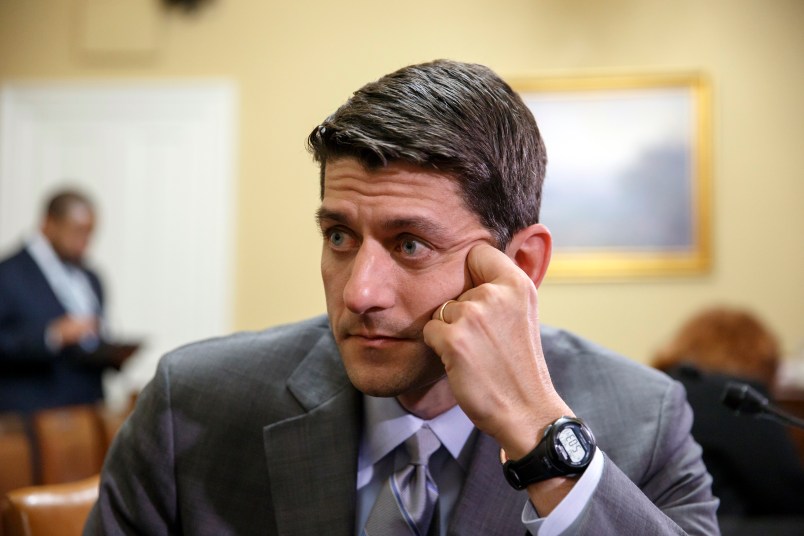Top Republicans, eyeing full control of Congress next year, are considering changing the rules of the budget process so as to make tax cuts appear less harmful to the deficit.
They want to adopt a method called “dynamic scoring,” popular among conservatives since the 1970s, which scores budgets under the controversial assumption that tax cuts generate economic growth and make up for lost revenue — something critics have likened to “fairy dust.” The nonpartisan Congressional Budget Office, the official scorekeeper, does not use the method, but Republicans, and even some conservative Democrats, want it to.
House Budget Committee Chair Paul Ryan (R-WI), who expects to chair the tax-writing Ways & Means Committee next year, floated the idea of requiring CBO to use dynamic scoring at a Financial Services Roundtable speech on Sept. 18. Likely next Majority Leader if Republicans can win the Senate, Sen. Mitch McConnell (R-KY) championed the method in a 2013 interview with the National Review. Outside proponents of supply-side economics, such as the Wall Street Journal editorial board, also like the idea.
“In practice, dynamic scoring is just another way for Republicans to enact tax cuts and block tax increases,” economist Bruce Bartlett argued in the New York Times in 2013. “It is not about honest revenue-estimating; it’s about using smoke and mirrors to institutionalize Republican ideology into the budget process.”
The fundamental problem with dynamic scoring is that it requires the CBO to make dubious assumptions about the future economy, and extrapolate those assumptions into job-creating effects as a result of tax cuts.
“We think it is a mistake to count those chickens before they hatch and basically incorporate those into the official scoring of the bill,” said Loren Adler, a fiscal policy expert with the Committee for a Responsible Federal Budget. “Macroeconomic modeling is highly uncertain … especially if you’re talking about the dynamic effects of tax cuts.”
There’s little doubt that a Republican Congress would have the majority of votes: needed to establish dynamic scoring. The House passed a bill to do that in April 2014 and even the Democratic-led Senate narrowly endorsed the idea in 2013.
The deficit-hiking impact of tax cuts has posed problems for Ryan every year since 2011. In his budget blueprints for the GOP, he has proposed to reduce the deficit while enacting large tax cuts, raising military spending, and refusing to cut so much as a penny from Medicare or Social Security over the 10-year budget window. Democrats have made the case that those numbers cannot add up without savage cuts to popular domestic discretionary programs like Pell Grants, Head Start, food stamps and Medicaid.
Democratic leaders and progressive economists reject dynamic scoring as an accounting gimmick, pointing to the aftermath of the Bush tax cuts as evidence that tax breaks are costly.
Adler said it’s fine to provide dynamic scoring forecasts as a supplement to conventional scoring, but he argued that it shouldn’t be the official standard.
“I think folks are more optimistic about what dynamic scoring will do than will actually happen,” Adler said. “I think almost everyone overestimates the positive impacts of their own pet project.”







Cheating the system seems to be the only way Republicans ever win. Don’t they realize that they are building themselves a house of cards that will eventually crumble around them?
What a crock of shit!
What could possibly go wrong with that? Look at what a boon it was for Kansas!
Voodoo? Who do?
When it collapses, a Democrat will come in and try to fix it, only to be thwarted at every turn by the GOP, then blamed for not fixing it.